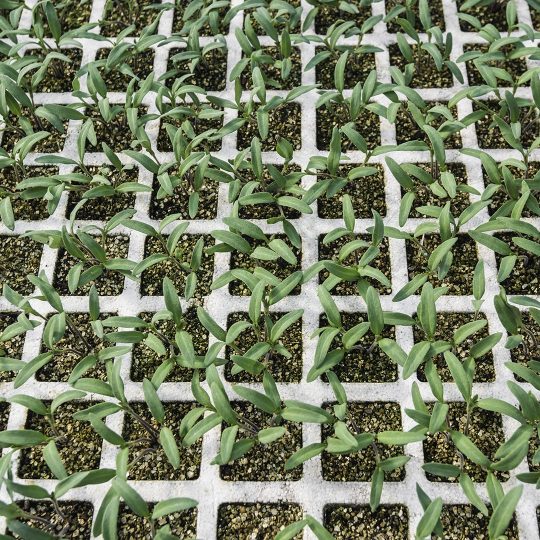Not Just an Art—it’s a Science
Cation Exchange Capacity in Vermiculite

Growing your plants strong, healthy, and robust is not just an art—it’s a science. Success doesn’t come by chance, it comes from careful planning, the right environment, and the right soil. Today, we’re taking a close look at the science of how cation exchange capacity (CEC) impacts plant health and how vermiculite can be used to help you grow great.
About Cation Exchange Capacity
Nutrient Elements in Soil
Experienced horticulturalists and agronomists know the importance of different nutrient elements in the soil. Three of the most important are macronutrients nitrogen, potassium, and phosphorus and you will typically find these represented as NPK ratios on a fertilizer label. However, other micronutrients are essential to help plants grow, and sometimes they vary by plant type. Each nutrient holds an electrical charge called ions. Positive-charged ions are called cations while negative-charged ones are called anions.
Cations include:
- Calcium
- Magnesium
- Potassium
- Ammonium
- Hydrogen
- Sodium
Anions include:
- Chlorine
- Nitrate
- Sulfate
- Phosphate
The Importance of Having a High Cation Exchange Capacity
Cation exchange capacity, referred to as CEC, indicates soil’s ability to store a particular group of nutrients. Think of it like a magnet. Negatively charged soil, like clay and organic matter particles, attract and hold positive-charged particles. Negatively charged particles repel other negative particles. You need a balance of positive and negative to improve your plant’s success rate.
The higher the negative charge of the soil, the more cations that can be held. In this instance, the soil is considered to have a high cation exchange capacity. Oppositely, those with fewer cations are considered to have a low cation exchange capacity. Soils with a high cation exchange capacity provide the following benefits over low-CEC soils:
- Holds more fertilizer elements to give them back to plants later
- pH changes much slower than low-CEC soils and the soil does not need to be limed as frequently
- Limited cation leaching unlike low-CEC soils that can result in nitrogen and potassium leaching below the root zone
Using Vermiculite to Improve Cation Exchange Capacity
Vermiculite is a hydrated magnesium aluminum sheet silicate mineral closely related to mica, and has all of the thermal and chemical resistance mica is known for. When subjected to heat, vermiculite expands and forms particles that are very productive in soil and soilless media mixes. Vermiculite has a negative charge and contributes greatly to cation exchange and buffer capacity, providing significant benefits for plants including:
- Delivers nutrients: Vermiculite attracts and holds positively charged ions, like potassium, magnesium, calcium, and ammonium, releasing these vital elements to the plant roots. It even contains potassium and magnesium, which are then available as a supplemental slow-release supply of essential nutrients!
- Effectively re-releases nutrients. The cation-exchange capacity allows it to re-release vital elements to the plant roots as required.
Specialty Vermiculite’s Vermiculite
Vermiculite is found all over the world, including Australia, Brazil, Bulgaria, Kenya, Russia, South Africa, Uganda, the USA, and Zimbabwe. Specialty Vermiculite mines and processes vermiculite concentrate in facilities located in Enoree, South Carolina. Vermiculite is mined using open cast mining techniques where the ore is separated from other minerals and then screened or classified into several basic particle sizes.
Our Horticultural Vermiculite #3
Horticultural Vermiculite #3 is small, mighty, and in charge. This grade of vermiculite has small, absorbent particles which have more surface area than large-sized particles, resulting in superior water- and nutrient-holding capabilities. It is inorganic and ready to use. With a negative charge, it provides an excellent cation-exchange capacity and attracts and holds positively charged ions.
Horticultural Vermiculite #3 was purposefully developed with successful growing in mind.
- Improves aeration. The expanded particles create matrixes in the soil, delivering air to the roots.
- Improves water retention: Smaller size particles have increased surface area for superior water retention in the capillary pores by approximately 20% of coarser grades of vermiculite.
- Improves wettability: It can absorb more moisture quicker than coarser grades.
- Exhibits greater particle strength: Because of its small size, it is less likely to break down during mixing and handling
For Reliable Growing Mediums, Choose Dicalite Management Group.
Specialty Vermiculite is a part of Dicalite Management Group, an international industrial minerals company with a unique multi-mineral platform including perlite, vermiculite, and diatomaceous earth, represented across three brands. Our sales and technical services team work closely together to ensure you are getting the right product for your horticultural needs. We know you’ll love the results of using our minerals, so we’d like to send you a free sample. Call us today at 866-728-3303 to request your sample and speak with a knowledgeable representative.
There’s more to explore! Use our Product Search Database to search and find your diatomaceous earth and all the technical information related to it. At any moment in time, you can access our products’ Technical Data Sheets (TDS), Safety Data Sheets (SDS), and sales support materials (when applicable). Find the right mineral solution is easy: simply apply filters so you only see the products relevant to you.
Join Our Mailing List
Our blog offers insight and information about new and exciting uses for perlite, diatomaceous earth, and vermiculite deriving from years of research and application. From passive fire resistance to mineral depth filtration, by subscribing to our mailing list, you will receive the latest information surrounding the Dicalite, Dicaperl, and Specialty Vermiculite brands and products.